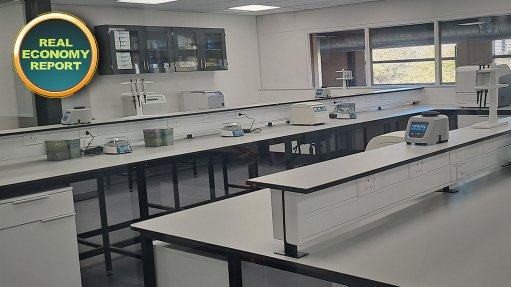Building confidence remains under pressure
Financial services firm First National Bank (FNB) and the Bureau of Economic Research Building Confidence Index declined to 35 points in the third quarter of the year from 39 points in the second quarter, indicating that 65% of respondents are dissatisfied with prevailing business conditions.
Further, while the composite index remains higher than the average of the past few years, the index, excluding the hardware retail and building material manufacturing sector, measuring the confidence in the core building sector, fell to 20 from 25 in the second quarter.
“Since the start of the year, confidence in the core building sector has been noticeably lower than the overall composite index, highlighting the persistent weakness in the larger-by-value brick and mortar segments,” says FNB senior economist Siphamandla Mkhwanazi.
Main contractor confidence slipped to 18 in the third quarter, from 22 in the second quarter. The lower sentiment was underpinned by a slowdown in activity.
Subcontractor confidence declined to 21 from 29 in the second quarter.
Of concern is the severe pressure on overall profitability. The activity and profitability indices usually move together. While this is still the case, over the past few quarters the extent to which the profitability index declined has far exceeded that of activity, he says.
“This divergence suggests that contractors are unable to pass the higher input costs on to clients and seem to be absorbing these costs instead to maintain competitiveness,” says Mkhwanazi.
Further, activity along the building pipeline also declined. This resulted in the confidence of architects moving five points lower to 18 index points in the third quarter of the year, while the confidence of quantity surveyors also declined five points to 21.
“Confidence is broadly lower than what the level of activity would suggest, and it is likely that other factors are also detracting from sentiment.
"In particular, respondents have noted the delays in project approvals and pressure on fees,” says Mkhwanazi.
Further, the confidence of residential contractors, albeit still low, vastly exceeded that of their non-residential counterparts.
“The struggles in the nonresidential property market are well documented and it is no surprise that they continue to underperform,” he adds.
Meanwhile, hardware retailer confidence gained a further 12 index points to reach 77 in the third quarter of the year, from 65 in the second quarter, which is the highest level since 2007.
Retail sales of hardware continued to surprise on the upside, boosting confidence. In addition, higher selling prices have helped to lift profitability significantly.
“The factors driving hardware sales such as do-it-yourself projects, additions and alterations and the informal building sector may be running out of steam if the recent commentary by some of the larger listed firms is anything to go by.
"However, the third quarter survey results suggest nothing of the sort as yet,” highlights Mkhwanazi.
Additionally, the confidence of building material manufacturers declined to 55 in the third quarter from 67. The lower confidence was underpinned by weaker production and a worse-than-expected outcome for domestic demand.
In contrast, export sales fared well.
“Sentiment in the building sector remains downbeat. Part of this is owing to the moderation in main contractor activity which, in turn, has seen profitability come under noticeable strain.
“Other factors not explicitly captured by the survey have also dampened sentiment. These include delays in the municipal approval of projects, the so-called construction mafia and government inaction regarding the rollout of key building projects.”
This contrasts with the more upbeat results for the retail hardware sector. This, however, may not be sustained for much longer, Mkhwanazi warns.
Comments
Press Office
Announcements
What's On
Subscribe to improve your user experience...
Option 1 (equivalent of R125 a month):
Receive a weekly copy of Creamer Media's Engineering News & Mining Weekly magazine
(print copy for those in South Africa and e-magazine for those outside of South Africa)
Receive daily email newsletters
Access to full search results
Access archive of magazine back copies
Access to Projects in Progress
Access to ONE Research Report of your choice in PDF format
Option 2 (equivalent of R375 a month):
All benefits from Option 1
PLUS
Access to Creamer Media's Research Channel Africa for ALL Research Reports, in PDF format, on various industrial and mining sectors
including Electricity; Water; Energy Transition; Hydrogen; Roads, Rail and Ports; Coal; Gold; Platinum; Battery Metals; etc.
Already a subscriber?
Forgotten your password?
Receive weekly copy of Creamer Media's Engineering News & Mining Weekly magazine (print copy for those in South Africa and e-magazine for those outside of South Africa)
➕
Recieve daily email newsletters
➕
Access to full search results
➕
Access archive of magazine back copies
➕
Access to Projects in Progress
➕
Access to ONE Research Report of your choice in PDF format
RESEARCH CHANNEL AFRICA
R4500 (equivalent of R375 a month)
SUBSCRIBEAll benefits from Option 1
➕
Access to Creamer Media's Research Channel Africa for ALL Research Reports on various industrial and mining sectors, in PDF format, including on:
Electricity
➕
Water
➕
Energy Transition
➕
Hydrogen
➕
Roads, Rail and Ports
➕
Coal
➕
Gold
➕
Platinum
➕
Battery Metals
➕
etc.
Receive all benefits from Option 1 or Option 2 delivered to numerous people at your company
➕
Multiple User names and Passwords for simultaneous log-ins
➕
Intranet integration access to all in your organisation


















